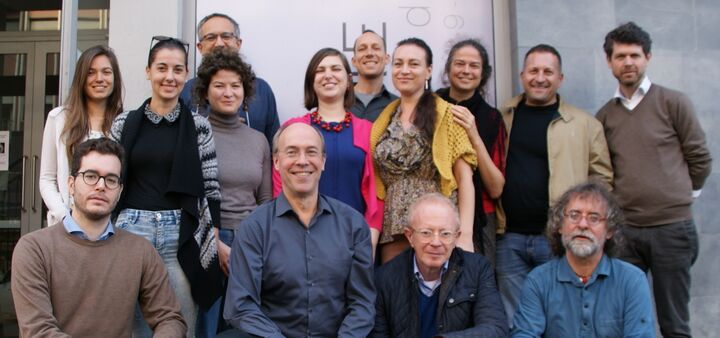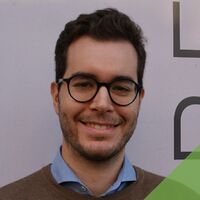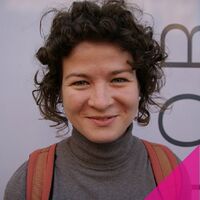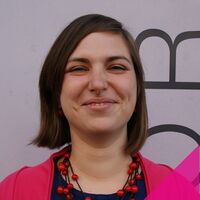Project team LED2LEAD: Difference between revisions
Jump to navigation
Jump to search
No edit summary |
No edit summary |
||
| (3 intermediate revisions by 2 users not shown) | |||
| Line 1: | Line 1: | ||
[[File:GROUP.JPG|thumb|720px| | [[File:GROUP.JPG|thumb|720px|none|The LED2LEAP project team at the international meeting in Bologna, October 2019.]] | ||
{| class="wikitable" | {| class="wikitable" | ||
| Line 28: | Line 28: | ||
'''Project Statement''' "The LED2LEAP Project is a very good occasion for students to learn participatory tools through good practices examples and to experience them applied with a real community during the living lab. Moreover, the multicultural environment this European online program brings is enriching for students and partners too." | '''Project Statement''' "The LED2LEAP Project is a very good occasion for students to learn participatory tools through good practices examples and to experience them applied with a real community during the living lab. Moreover, the multicultural environment this European online program brings is enriching for students and partners too." | ||
|- | |- | ||
|[[File:ZSOFIA.png|200px]]||'''Zsofia Szonja Illes, | |[[File:ZSOFIA.png|200px]]||'''Zsofia Szonja Illes, team member Kultur Aktiv:''' A multidisciplinary artist and designer with a socially engaged practice. Completing her masters degree (MDes) in Design Innovation and Environmental Design at the Glasgow School of Art, where her practice-led research looks at creating accessible and democratic engagement processes and toolkits for land research and mobilizing alternative voices and experiences of the landscape when defining how vacant and derelict land might be used. Through sound mapping and storytelling she is exploring ways in which notions such as ‘having a voice’ can go beyond the metaphorical, and sensory engagement can create accessible consultation processes. Having delivered a diverse body of collaborative work internationally she has worked on projects and public installations for TATE Britain, London Design Week and Istanbul Biennale. She is a collaborating artist at the Center of Contemporary Art (CCA: Glasgow) as part of their ’School for Civic Imagination’ public engagement programme and she is working with IDensitat to deliver and urban sound mapping project and installation in Barcelona. | ||
'''Project Statement''' Zsófia believes in the role of education to encourage engagement, develop social sensitivity, empower for democratic self-organisation through methods of participatory design and critical design thinking. | '''Project Statement''' Zsófia believes in the role of education to encourage engagement, develop social sensitivity, empower for democratic self-organisation through methods of participatory design and critical design thinking. | ||
|- | |- | ||
| Line 45: | Line 45: | ||
|[[File:DENI.JPG|200px]]||'''Prof. Deni Ruggeri, Project Coordinator:''' Deni Ruggeri is an Associate Professor in the Institute for Landscape Architecture and Spatial Planning at the Norwegian University of Life Sciences (NMBU), Norway. His research focuses on the social dimensions of landscape and urban design, and the promotion and evaluation of bottom-up, participatory co-creation, and redevelopment processes. His work investigates the landscapes' influence on people's place identity and attachment, digital and analog methods, and tools for participatory co-creation, and the design of landscapes that support physical and mental well-being, ecological health, economic viability, identity, delight, and biophilia. He is the author of 25 publications and co-editor of "Defining Landscape Democracy. A Path to Spatial Justice" (Glos, UK: Edward Elgar Publishing, 2019) Deni Ruggeri's education includes a Ph.D. in Landscape Architecture and Environmental Planning from the University of California, Berkeley, and graduate degrees in both Landscape Architecture and City Planning from Cornell University. He has practiced landscape architecture in California and Colorado and has International experience in leading community design and visioning processes and workshops. Before joining NMBU, Deni has taught in the USA at the University of Oregon and Cornell University. Deni Ruggeri has lectured at many institutions around the US, Canada, Europe, and Asia, and is a visiting instructor at UC Davis and the University of California, Berkeley. | |[[File:DENI.JPG|200px]]||'''Prof. Deni Ruggeri, Project Coordinator:''' Deni Ruggeri is an Associate Professor in the Institute for Landscape Architecture and Spatial Planning at the Norwegian University of Life Sciences (NMBU), Norway. His research focuses on the social dimensions of landscape and urban design, and the promotion and evaluation of bottom-up, participatory co-creation, and redevelopment processes. His work investigates the landscapes' influence on people's place identity and attachment, digital and analog methods, and tools for participatory co-creation, and the design of landscapes that support physical and mental well-being, ecological health, economic viability, identity, delight, and biophilia. He is the author of 25 publications and co-editor of "Defining Landscape Democracy. A Path to Spatial Justice" (Glos, UK: Edward Elgar Publishing, 2019) Deni Ruggeri's education includes a Ph.D. in Landscape Architecture and Environmental Planning from the University of California, Berkeley, and graduate degrees in both Landscape Architecture and City Planning from Cornell University. He has practiced landscape architecture in California and Colorado and has International experience in leading community design and visioning processes and workshops. Before joining NMBU, Deni has taught in the USA at the University of Oregon and Cornell University. Deni Ruggeri has lectured at many institutions around the US, Canada, Europe, and Asia, and is a visiting instructor at UC Davis and the University of California, Berkeley. | ||
'''Project Statement''' The challenges our society faces are wicked and defy simplistic problem-solving. Addressing these challenges, from climate change to densification, from public health to sustainable city development cannot be the work of a few experts alone, but result from partnerships between private and public, science and creativity, expert and local knowledge. And, as the European Landscape Convention tells us, the transformations required to address such challenges should be democratic, participatory, equitable, and owned by all residents, native or newcomers, insiders or outsiders. At the foundation of these transformations is the landscape—its natural areas, sacred places, and those abused by urbanization and industrialization. Re-interpreted as a shared resource for future resilience, this landscape needs to be re-discovered, re-generated, and integrated into the fabric of our communities, so it may bring livability, health and delight to those residents that need it the most—the marginalized, the unheard, the outcast, the queer. The LED2LEAP foregrounds this commitment to partnerships in co-creation, by linking community organizations to the creativity of budding design and planning professionals. It does so through an educational program educating them about the theory, methods, and practices of landscape democracy in the context of a pedagogy that frees communities and students from pre-existing pre-conceptions and limitations to unleash creative partnerships of mutual learning and cross-contamination. The ultimate goal is to envision new futures for the landscape, the communities, and those who call these landscapes home. The LED2LEAP project aims to plant to seed for meaningful transformations in its partner communities, the campuses of our educational partners, and the minds and hearts of the students, volunteers, tutors, community partners, and instructors it will bring together. | '''Project Statement''' The challenges our society faces are wicked and defy simplistic problem-solving. Addressing these challenges, from climate change to densification, from public health to sustainable city development cannot be the work of a few experts alone, but result from partnerships between private and public, science and creativity, expert and local knowledge. And, as the European Landscape Convention tells us, the transformations required to address such challenges should be democratic, participatory, equitable, and owned by all residents, native or newcomers, insiders or outsiders. At the foundation of these transformations is the landscape—its natural areas, sacred places, and those abused by urbanization and industrialization. Re-interpreted as a shared resource for future resilience, this landscape needs to be re-discovered, re-generated, and integrated into the fabric of our communities, so it may bring livability, health and delight to those residents that need it the most—the marginalized, the unheard, the outcast, the queer. The LED2LEAP foregrounds this commitment to partnerships in co-creation, by linking community organizations to the creativity of budding design and planning professionals. It does so through an educational program educating them about the theory, methods, and practices of landscape democracy in the context of a pedagogy that frees communities and students from pre-existing pre-conceptions and limitations to unleash creative partnerships of mutual learning and cross-contamination. The ultimate goal is to envision new futures for the landscape, the communities, and those who call these landscapes home. The LED2LEAP project aims to plant to seed for meaningful transformations in its partner communities, the campuses of our educational partners, and the minds and hearts of the students, volunteers, tutors, community partners, and instructors it will bring together. | ||
|- | |- | ||
|[[File:ANNA.JPG|200px]]||'''Anna Szilagi-Nagy, Project Coordinator:''' Anna Szilágyi-Nagy is an MSc landscape architect with a professional interest is to promote playful and creative practices that engage communities with urban planning. She is passionate about youth empowerment and as vice-president of the kultúrAktív Egyesület, a Hungarian NGO that fosters built environment education for children, she coordinates projects that encourage young people to actively shape their environment. She proudly coordinates the development process of the live board game ‘Urbanity’ and urban activism game ‘Playhellocity’. As a PhD student at the University of Tubingen, she researches about the transformation of landscape democracy practices through games. As a board member of the LE:NOTRE Institute, she is interested in linking landscape democracy to the education, research and practice of landscape architecture on local and international level. | |[[File:ANNA.JPG|200px]]||'''Anna Szilagi-Nagy, Project Coordinator:''' Anna Szilágyi-Nagy is an MSc landscape architect with a professional interest is to promote playful and creative practices that engage communities with urban planning. She is passionate about youth empowerment and as vice-president of the kultúrAktív Egyesület, a Hungarian NGO that fosters built environment education for children, she coordinates projects that encourage young people to actively shape their environment. She proudly coordinates the development process of the live board game ‘Urbanity’ and urban activism game ‘Playhellocity’. As a PhD student at the University of Tubingen, she researches about the transformation of landscape democracy practices through games. As a board member of the LE:NOTRE Institute, she is interested in linking landscape democracy to the education, research and practice of landscape architecture on local and international level. | ||


















